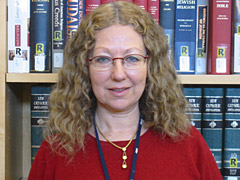
The Radcliffe Institute for Advanced Study at Harvard University has selected Prof. Renée Poznanski to be a Radcliffe Institute Fellow for the 2012–2013 academic year. Poznanski is among the 51 women and men who will pursue independent projects in the arts, humanities, sciences, and social sciences within the rich, multidisciplinary community. After a highly competitive peer-review process, she is among only 5 percent of applicants who were accepted to create a diverse incoming class that ranges from A to V: including anthropologists, chemical engineers, linguists, literature professors, molecular biologists, musicologists, and visual artists.
“As an alumna of the Institute’s Fellowship Program, it is a special pleasure for me to welcome these distinguished individuals to a year of exploration, innovation, and creation,” said Lizabeth Cohen, Dean of the Radcliffe Institute for Advanced Study. “We expect that each fellow will enjoy a year of profound growth and great productivity.”
Prof. Renée Poznanski is the Yaakov and Poria Avnon Professor of Holocaust Studies in BGU’s Department of Politics and Government, which she created and headed for several years. She has published extensively on Jews in France during WWII and her research examines the daily life of Jews in France during the war, relations between Jews and non-Jews, as well as the impact of memory on the historiography of this period. Her book The Jews in France during the World War II, (University Press of New England, 2001) was awarded the Jacob Buchman Prize for the Memory of the Holocaust. Her last book on The Propaganda of the Resistance and the Persecution of the Jews, (Fayard, 2008) was awarded the 2009 Henri Hertz prize by the Chancellerie des Universités de Paris.
While a Radcliffe fellow, Prof. Poznanski intends to write a book on Jewish Resistance in France during WWII. Relying on a large quantity of archival material, her purpose in this research is to use an integrative approach, combining what has been the concern of historians dealing with French resistance to the Occupation and the Vichy regime, and what was examined by historians focusing on the Jews reactions against the anti-Semitic policy, while drawing from the most recent research on the social history of the period and on different sociological writings on the phenomenon of resistance. Her ambition is to re-consider the Jewish Resistance as a chapter in the history of French Jewry and throw a new light on the French Resistance as a whole.
The Radcliffe Institute for Advanced Study at Harvard University is dedicated to creating and sharing transformative ideas across the arts, humanities, sciences, and social sciences. The Fellowship Program annually supports the work of 50 leading artists and scholars. Academic Ventures fosters collaborative research projects and sponsors lectures and conferences that engage scholars with the public. The Schlesinger Library documents the lives of American women of the past and present for the future, furthering the Institute’s commitment to women, gender, and society.
